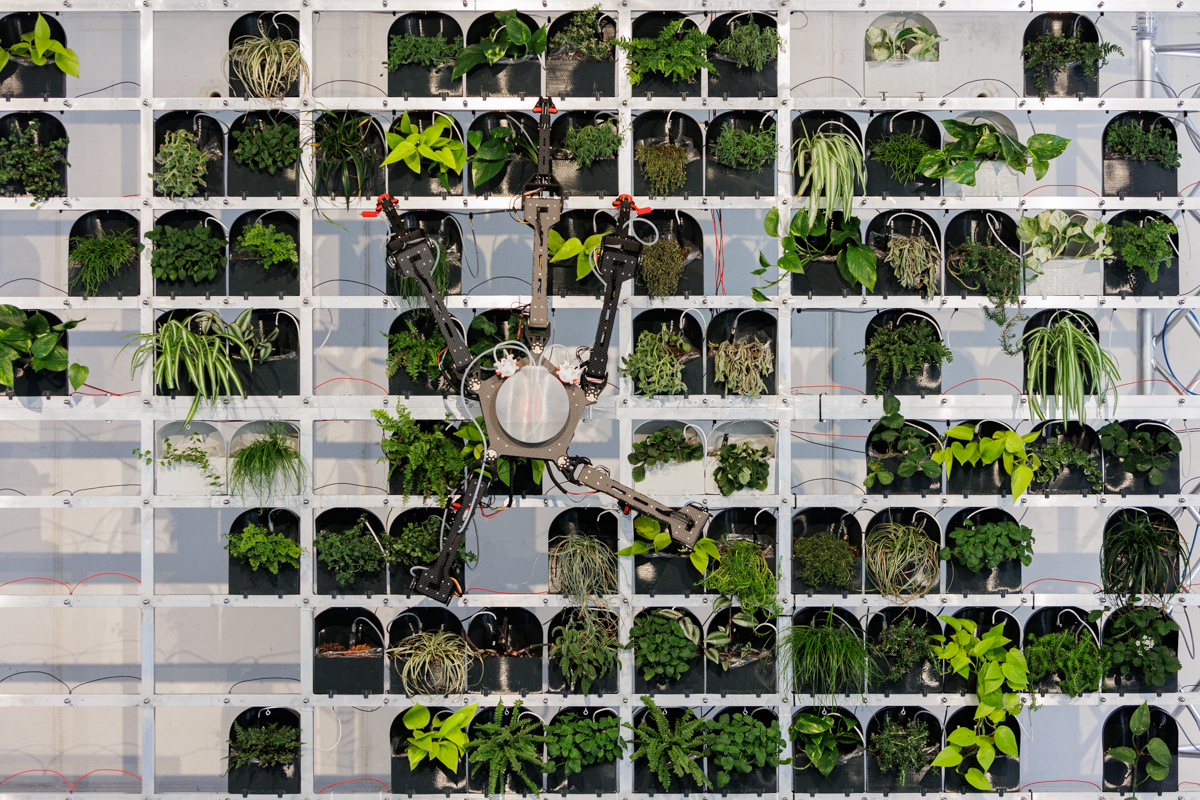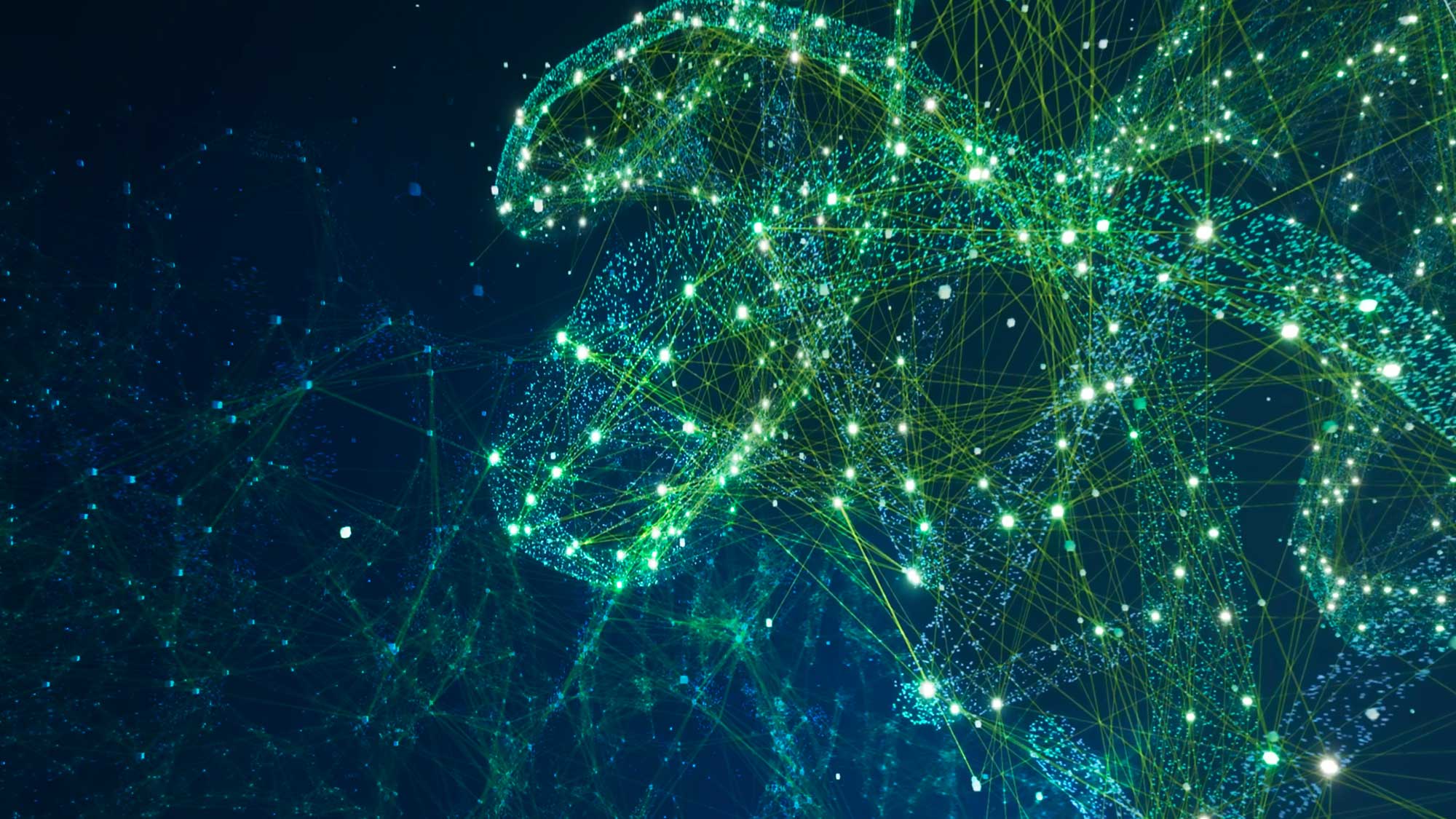Ars Electronica Festival, Linz, Austria, September 6 – 10, 2023
Yesterday we thought we were the crown of creation, today we must face the fact that we are only a small – albeit powerful – part of the planet’s ecosystem. From this in turn follows that the future of our species is inseparably linked with the prosperity or ruin of the great whole – so this year we have dedicated a whole festival day to the bigger picture of planet Earth.
(Un)Earthing the Truth:
A More-than-Planet Conference
The conference on Friday draws parallels between ownership of nature and the nature of ownership. In debates and keynotes traversing the deep seas and the stratospheric skies, we reshape our understanding of ownership, recontextualizing the dominant economic systems and power hierarchies that have allowed us to establish proprietary relationships with our planet.

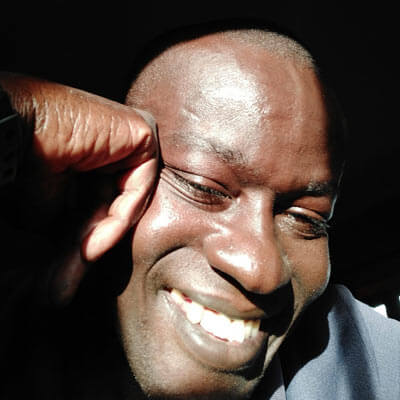
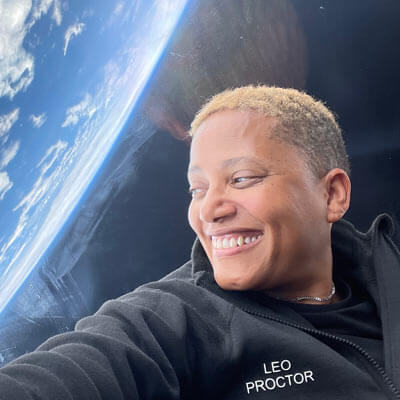
-
The myth of tech innovation as a savior
Aina Abiodun (CA)
As a storyteller who transitioned into the world of climate tech and finance, Aina Abiodun sees the prevailing narratives around climate solutions as limiting and inadequate to meet the biggest existential challenge humans have faced. Her talk challenges the dominant, Western patriarchal mindset that drives climate innovation and calls for rethinking the systems and myths…
-
Ownership of narratives
Mordecai Ogada (KE)
Who controls the narrative around nature preservation, and what does this get them? A trained spatial planner and an award-winning Kenyan journalist Mordecai Ogada has investigated and written on wildlife conservation since 2000.
-
Who owns Space?
Sian Proctor (US)
How does the entitlement we feel over the earth change when we look at it from outer space? SpaceX Inspiration4 Astronaut Sian Proctor is not only a pilot for the first all-civilian human spaceflight mission, but also a geology professor and science communicator.
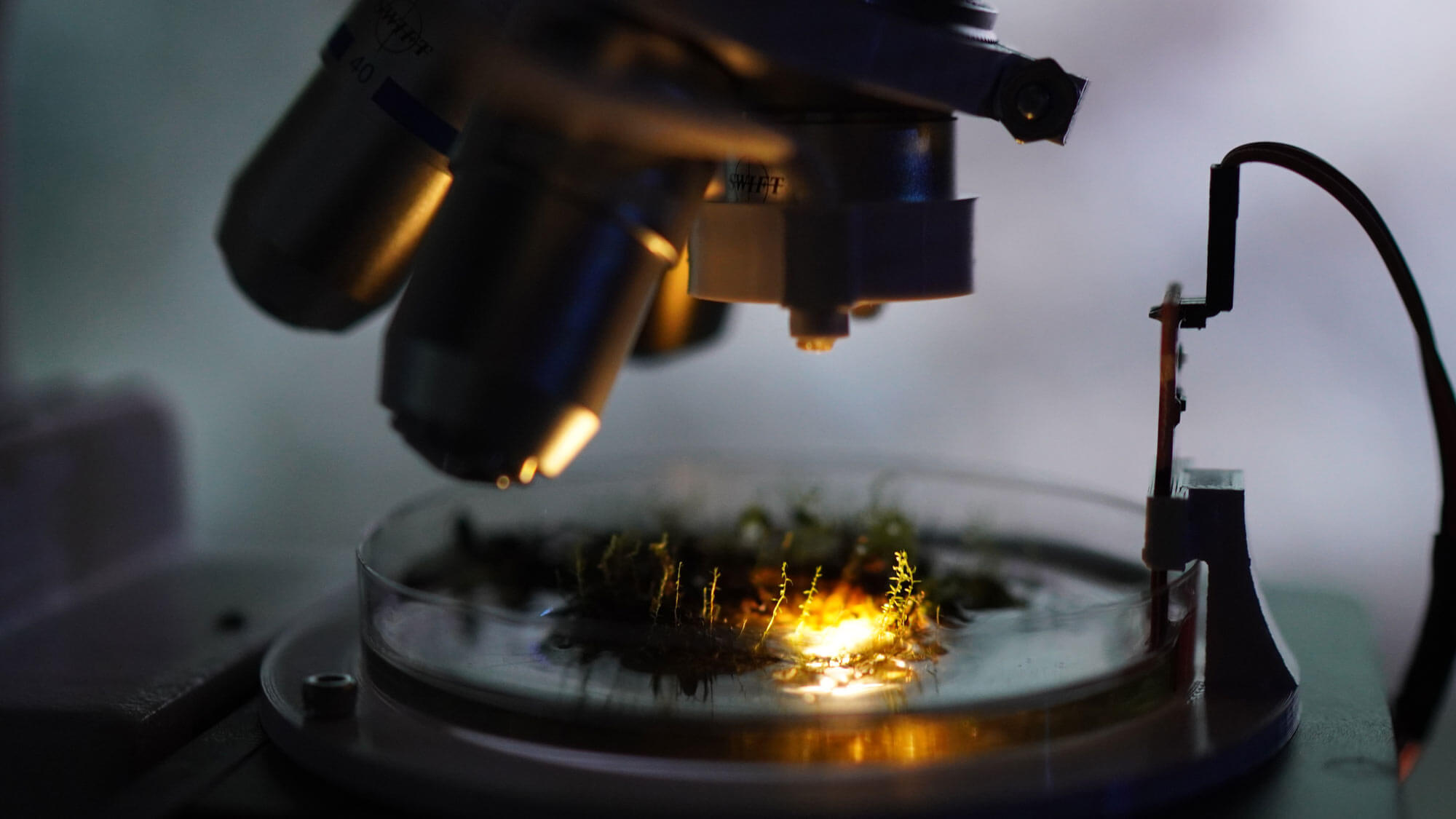
More-than-Planet Day
Friday, 8.9.
Check out Exhibitions at POSTCITY and Lentos Kunstmuseum!
Zoom in to explore the microorganisms we depend on, follow the history of a toxic color pigment or marvel at fish using robots according to their needs. These thought-provoking projects invite visitors to reflect upon their relationships to the ecosystems we live in, the generations that came before us and those who are yet to be born.
-
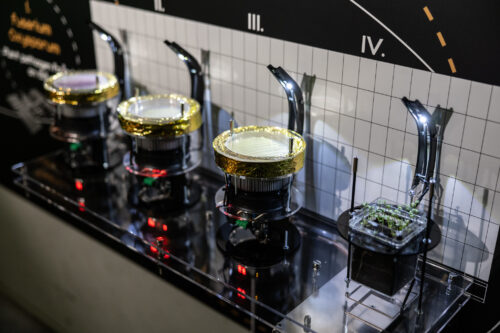
Biosymbiotic Exoskeleton
Dorotea Dolinšek (SI)
In this project, Dolinšek draws attention to our microbiome as an organ of great importance for our survival, not only in an ontological sense but also in a very personal, intimate way. Here, being alive in radical conditions as outer space is challenging life; being alive means being in symbiosis with non-human living systems.
-
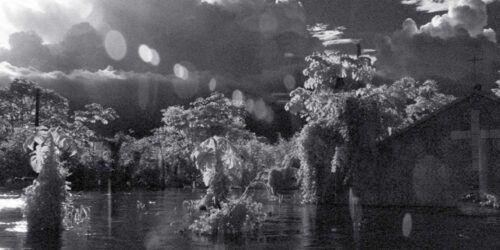
Broken Spectre
Richard Mosse (IE)
Broken Spectre is a disquieting portrait of willful environmental catastrophe along the Trans-Amazonian Highway told through a kaleidoscope of scientific, cultural, historic, socio-political, activist, and anthropological filters.
-
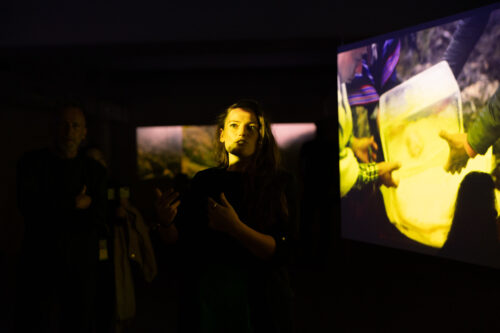
Cartographies of the Unseen
Felipe Castelblanco (CO), Lydia Zimmermann (CH)
Through participatory filmmaking, this project creates an inter-epistemic dialogue with Indigenous territorial logics from the South of Colombia to explore the forest as a system of volumes that extends across a vertical axis of occupation and resistance, above and below ground.
-
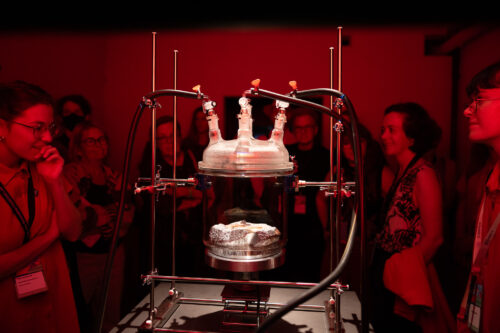
FORMATA
PЯОТO-ALIEИ PЯOJECT (CO/JP)
Enter the extraterrestrial mini-planet of FORMATA, where alien blobs actively move and pulsate with energy. This multisensory art installation invites visitors to redefine our place in an active cosmos through a bodily encounter that challenges the prevailing narratives that shape our engagement with matter.
-
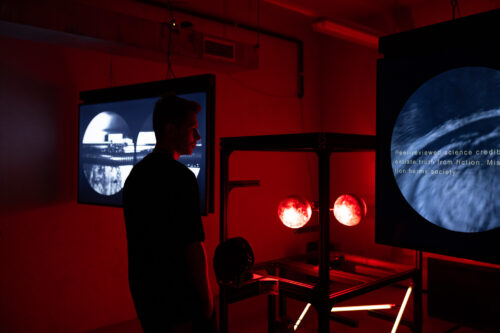
Massive Binaries
Andy Gracie (GB/ES)
Massive Binaries takes AI mediation of gravitational wave observations of neutron star mergers and polarized ideological viewpoints as the seeds of an evolving narrative about the fragility of progress, the struggle for consensus and the inevitability of collisions and fusions.
-
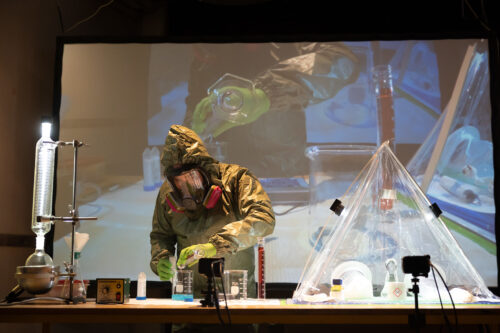
Shadows from the Walls of Death
Adam Brown (US)
Shadows from the Walls of Death is a long-term artwork that investigates the historical, chemical, and material agency of Paris Green, one of the most toxic pigments ever produced.
-
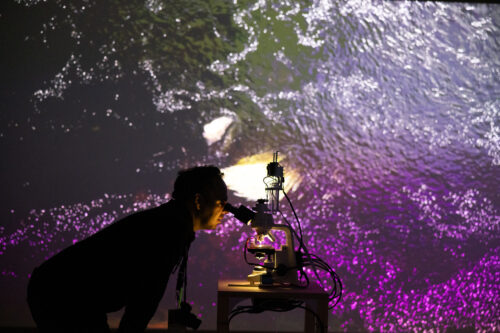
Sistema Cinco: Non-Human Determinations
Cristo Riffo (CL)
Sistema Cinco explores microorganism interdependencies, contrasting natural and human-made molecular technologies. It comprises a robotic microscope that explores microbial samples and AI for cybernetic management with algorithmic governance. Drawing inspiration from The Viable System—a non-hierarchical structure mirroring biological organisms’ nervous systems, used in the project Cybersyn (1971).
-
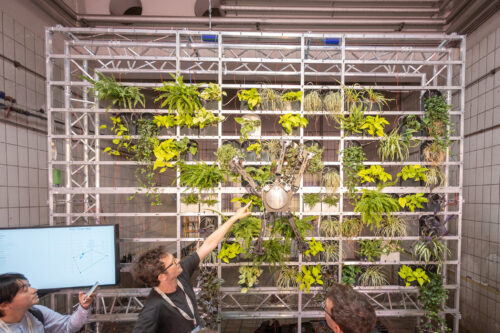
StellaVerde
Gregor Krpič (SI), Simon Gmajner (SI), Dr. Jan Babič (SI), Dr. Marko Jamšek (SI), Gal Sajko (Jožef Stefan Institute) (SI)
StellaVerde is a vertical garden arrangement, in which a functional connection between animals, plants and robots allows plants and animals (in this case fish) to use robots according to their needs. The robot, in this case a five-legged spiderbot, interprets the data and translates it into a watering rout(in)e for the spiderbot.
-
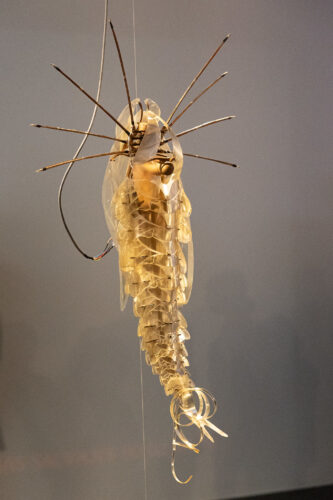
Wild Machines
Jonathan Torres Rodríguez (CR)
This project makes use of the power that speculative thought provides to imagine a present world that revalues to matter, a place of technologies whose preprogrammed expiration is in relation to the needs of the environments and not those of the economic system. Technologies that use energetic and material resources with balance.
-
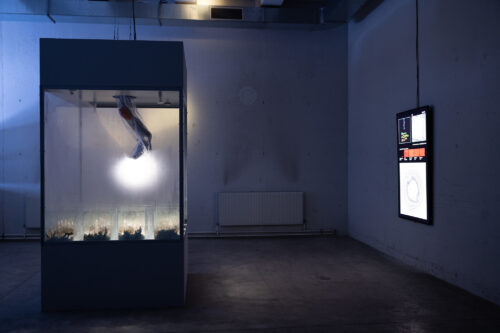
ZOE
Noor Stenfert Kroese (NL), Amir Bastan (IR)
Without claiming that we know what nature wants or needs. ZOE creates a possibility of unknowns coming together. Scientists do not know what this communication within the mycelium entails. It is the curiosity of what will happen when we do not know the outcome which in turn enables us to experience the process.
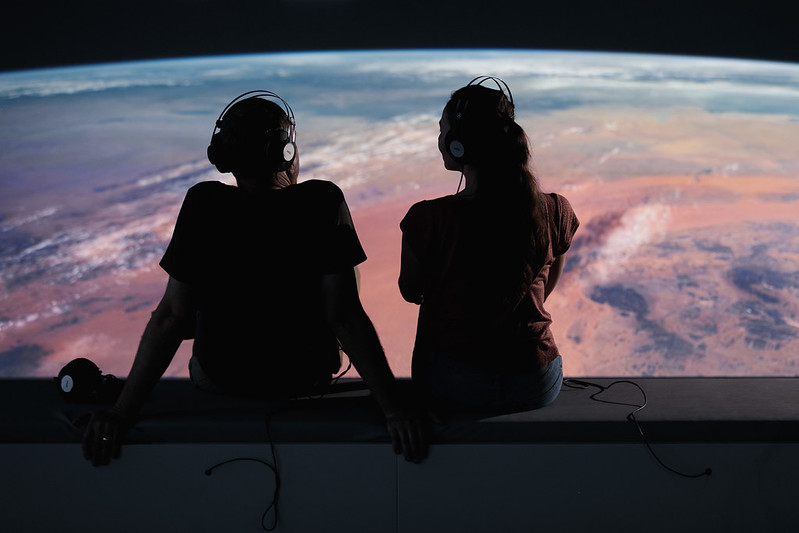
Share your own planetary visions at the More-than-Planet Lab!
From satellite images, CO2 data, sea level measurements to GPS data, technology has aided us in shaping our knowledge about the planet. Yet, what does it mean to own sets of data, information and precise imaginary of the planet we call home? At the More-than-Planet Lab we brew ideas, approaches and practices to reconstruct our concept of the planet and planetary imaginary.
-

Planetary Mattering
Miha Turšič (SI/NL)
It matters which planet we portray, and which one we do not. In this workshop, participants will learn about ways of mattering. With this term, we refer to the images, interests and facts that shape our image of the planet, and, in turn, how the solidification of these imaginaries determines the way we talk about…
-
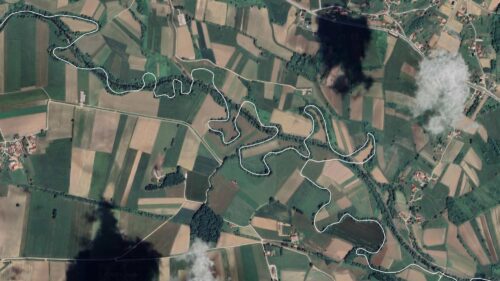
Planetary Public Stack
Miha Turšič, Waag Futurelab (SI/NL)
Strategic tools for researchers, creatives, artists and designers to better engage in socio-environmental transitions towards building heterogenous and inclusive understanding and expressions of shared planetary views, concerns, interests and heritage.
-
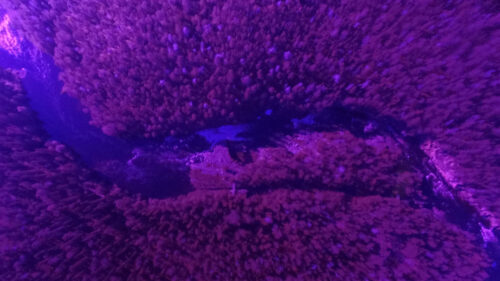
Systemic Change in the Times of Polycrisis
Antti Tenetz (FI), Tero Toivanen (FI)
The workshop “Systemic Change in Times of Polycrisis” explores how we can broaden our horizons and find sustainable solutions to the polycrisis caused by ecological emergency. It focuses on radical change in industrial societies. The perspectives of polycrisis will be linked to local examples that will be explored through the work of artists, researchers and…
Visit the Ars Electronica Center!
Calling itself the Museum of the Future, reflecting on our relationship with our planet has been part of the Ars Electronica Center’s mission from day one. Check out the exhibitions or marvel at the beauty of Earth’s interconnected systems at the Deep Space 8K.
